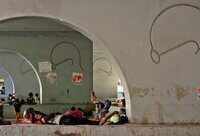Somnath to recycle waste scientifically

Before lockdown, Somnath Temple generated flowers and garlands of up to 90 kg on regular days and 500 kg on fests
Under central government's PRASAD , waste will be collected from centres under the trust along with Somnath town and some areas of Prabhas Patan
By Nischal Sanghavi
The Somnath temple, one of the 12 Jyotirlinga (self-manifested) shrines of Lord Shiva in coastal town of Veraval inSaurashtra , which opened on June 8 after the lockdown, has embarked on an ambitious project of recycling the huge collection of dry and wet waste it generates. Though the temple is yet to begin full-fledged operations, disciples have been offering flowers, leaves etc at the shrine. Besides plastic, metal, paper and other waste is also generated from the various centres run by the Somnath Trust.
According toPravin Laheri , secretary, Somnath Trust, "For the past few years, the Trust has been working to reduce pollution by banning the use of plastic within the temple premises, collecting waste among other things. Now we have decided to recycle the waste not only generated from the temple, but other surrounding areas falling under municipal jurisdiction in a scientific manner. We had designed this proposal 2 years ago and submitted it to the Central government under PRASAD (Pilgrimage Rejuvenation And Spiritual Augmentation Drive), which was approved by the government."
billi patra (leaves of bael tree that are offered to Shiva), flowers and garlands amounting to 90 kg on a regular day and 500 kg during festivals. Other wet waste collection amounts to 400 kg a day on regular days, which increases to 1,000 kg during festivals. "We have ordered special machinery to recycle the waste. The recycling has already started, but machines will arrive and full recycling will start within 20 days. The total project cost would be Rs 2.5 crore. Somnath would be the first temple in state to scientifically recycle the waste with such a sophisticated manner," Chavda said.
Giving details of the project, Solanki said, "All the waste collected would be brought to a place about one-and-a-half km from the temple. This place will be the Garbage Processing Unit. A huge shed of 13,600 sq ft has already been created at this place. The waste would be segregated at the processing site. The wet waste would be used to create manure, while the dry waste would be sold to scrap dealers. The green waste will take two days to process. Thereafter vermicomposting will be done for 45 days to get the manure ready for use. This will fertilise three billi patra farms and one mango farm. It will also be used at a farm that grows feed for the cattle, while the surplus feed would be sold at Rs 5/kg."
By Nischal Sanghavi
The Somnath temple, one of the 12 Jyotirlinga (self-manifested) shrines of Lord Shiva in coastal town of Veraval in
According to
As per Vijaysinh Chavda, general manager, Somnath Temple Trust, there are 40 temples, five guesthouses, gaushala, bhojanshala etc under the temple trust management. The temple generates waste of
We have decided to recycle the waste generated not only from the temple, but other surrounding areas falling under municipal jurisdiction in a scientific manner
Giving details of the project, Solanki said, "All the waste collected would be brought to a place about one-and-a-half km from the temple. This place will be the Garbage Processing Unit. A huge shed of 13,600 sq ft has already been created at this place. The waste would be segregated at the processing site. The wet waste would be used to create manure, while the dry waste would be sold to scrap dealers. The green waste will take two days to process. Thereafter vermicomposting will be done for 45 days to get the manure ready for use. This will fertilise three billi patra farms and one mango farm. It will also be used at a farm that grows feed for the cattle, while the surplus feed would be sold at Rs 5/kg."
GALLERIES View more photos



































Recent Messages ()
Please rate before posting your Review
SIGN IN WITH
Refrain from posting comments that are obscene, defamatory or inflammatory, and do not indulge in personal attacks, name calling or inciting hatred against any community. Help us delete comments that do not follow these guidelines by marking them offensive. Let's work together to keep the conversation civil.